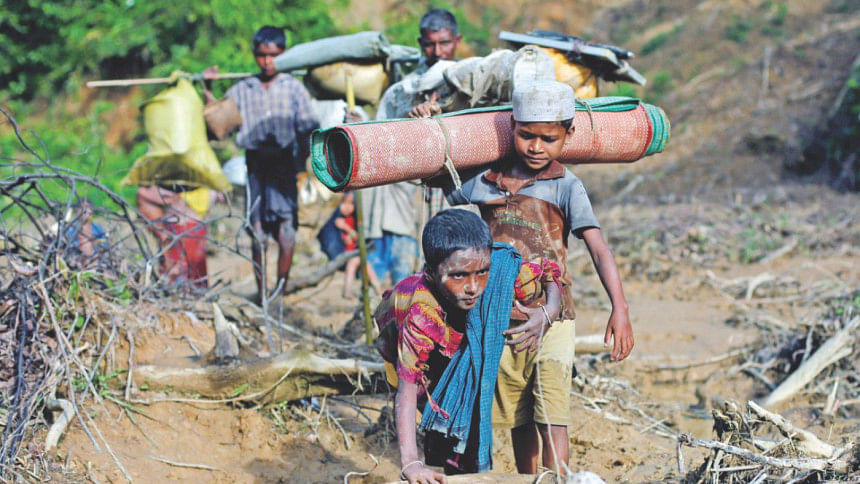Stories that dictate the Rohingya genocide

Former poster child for the cause of peace and democracy, Aung San Suu Kyi, has staunchly refused to halt or even criticise the violence being visited on the Muslim Rohingya minority, to the despair and puzzlement of many. One of the top results of googling "Rohingya" is a measured attempt to explain her position, a position that calls into question her worth as a Peace laureate. She maintains that it is an internal matter (uncomfortably familiar words to any Bangladeshi) and a battle against terrorism.
Whatever one thought of Bush and his War on Terror, he didn't include rape and active infanticide as core elements of his strategy.
However her version of events—a battle against the threat of Islamist terror—is one that for some people is an attractive counter-narrative to the mainstream global media's stance: to whit, that genocide is always a bad thing. Comments sections on international news sites and social media pages are an interesting sample of public opinion, and some people seem to buy into the idea that the mainstream media is lying (we after all live in the post-truth era) and that the Rohingyas' plight is either exaggerated or somehow deserved. These terrorism-truthers are who you'd expect: Myanmarese self-defenders, westerners who talk about Islam like it stole their car, and the Indian right-wing.
Narratives aren't merely some sort of trifling wrapper around the important hard facts. They are the core of how we see the world. We respond to good stories over good arguments.
We can reduce the framing of the Rohingya crisis to two competing narratives. In the first one the Rohingyas are innocent victims of government-backed ethno-religious persecution. The second has them as foreign upstarts, illegal Bangladeshi migrants to the Rakhine state, and the local purveyors of Islamist terror. Foreign in origin, language and faith, at best undeserving of a part in the Burmese nation, and at worse actively hostile to it. There are a range of narratives that bridge this gulf and stories that we can nestle under each of them (example, the Myanmarese junta is seizing land for settlement and development and vulnerable minority groups are the easiest to disenfranchise.) The reasoning and circumstances vary but the Rohingyas are either victims or victimisers. Suu Kyi is either a national hero or a traitor to the values the world thought she represented. The stories change based on the beliefs and priorities of the storytellers and the intended audience—and we in turn react to these narratives on an individual level.
Consider how we, as Bangladeshis, react to the crisis. The Rohingyas are Muslim, as are most of us. Just as in Myanmar, religion is a key part of the narrative used to justify the violence against the Rohingyas, for many Muslim Bangladeshis—and indeed Muslims abroad—it is the central fact that must guide the international response to the violence. Muslims have a moral duty to the Rohingyas: Bangladesh must admit more refugees from Myanmar because they are coreligionists. This is a point of view even espoused by Turkey's Erdogan, who has publicly offered to pay Bangladesh to house more Rohingyas. Matters of faith tend to trump all other concerns—at least in public opinion—and so for critics and supporters of the Rohingyas, their status as Muslims is central to the "plot".
This is not to say that Bangladeshis only support the Rohingyas because of Islam. Transcending identity politics, many of us are sympathetic to the Rohingyas just because it seems to be the right thing to do. This is the narrative of the humanitarian crisis. It is the attitude shared by the bulk of the mainstream Western media. The Rohingyas are clearly the victims of the narrative and deserve help. Religion is only relevant as a motivating factor of their oppression (or at least, the public face of it, referring back to the land-grabbing angle)—the support they receive is secular.
Only the emotional response to this developing story can explain how thousands of Rohingyas were accepted into Bangladesh despite our fragile economy, recent losses to floods and already near critical levels of population density.
In actuality the Rohingyas are neither simple innocents nor scheming fifth-columnists out to take over the Rakhine state. They are a million-odd people each with their own circumstances and stories and their relationship with their neighbours is informed by centuries of history and culture. Like anyone else they cannot simply be reduced to be heroes or villains—and yet they inevitably will be. We simply abhor an unclear narrative, and we need black-and-white moral decisions to form an actionable opinion. The Rohingyas must become a reduced, fictional version of themselves to fit our stories. In the realm of facts and reason this is a bad thing; but the real world doesn't operate on real logic.
While simple charity should in an ideal world be taken for granted, in this world of closed borders, ideologies and poverty, we can at least congratulate ourselves a little for having kept the door open to the Rohingyas. Make no mistake: arriving in Bangladesh is not necessarily a solution to all their problems, but at the very least they are for now safe from harm.
Zoheb Mashiur is an artist and a regular contributor to The Daily Star.





Comments